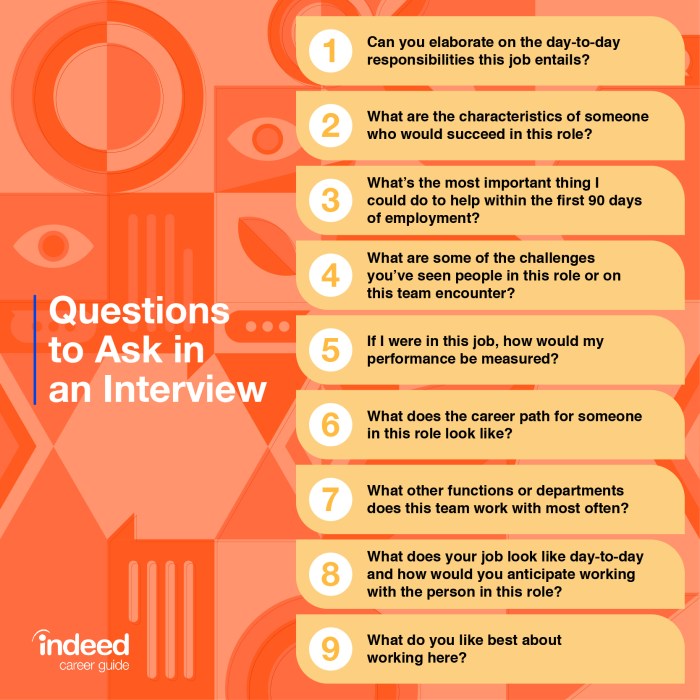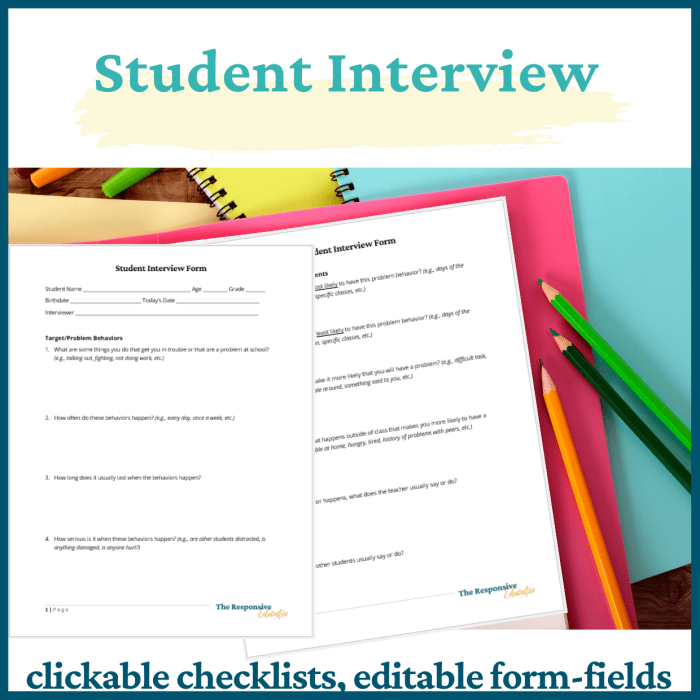Navigating FBA interview questions for teachers requires meticulous preparation and a deep understanding of the unique challenges and opportunities within Functional Behavioral Assessment (FBA) classrooms. This comprehensive guide provides a roadmap for success, empowering educators to confidently demonstrate their expertise and passion for supporting students with behavioral needs.
As you delve into the intricacies of FBA interview questions, you will discover effective strategies for preparing thoughtful and compelling answers, master the STAR method for addressing behavioral questions, and showcase your strong subject matter expertise. Moreover, you will gain insights into effective classroom management strategies, the importance of data-driven decision-making, and the art of collaboration and communication in FBA settings.
Interview Preparation
Interview preparation is a crucial step in securing a teaching position within an FBA program. Candidates should thoroughly familiarize themselves with common interview questions to demonstrate their knowledge, skills, and alignment with the program’s values.
These questions aim to assess a candidate’s understanding of FBA principles, their ability to apply them in practice, and their commitment to supporting students with challenging behaviors.
Interview Questions
-
Explain the principles and key components of Functional Behavior Assessment (FBA).
-
Describe the steps involved in conducting an FBA.
-
Discuss the importance of collecting and analyzing data during the FBA process.
li>
-
Explain how to develop and implement a Behavior Intervention Plan (BIP) based on FBA results.
-
Describe strategies for monitoring and evaluating the effectiveness of a BIP.
-
Discuss the role of collaboration with parents, administrators, and other professionals in the FBA and BIP process.
-
Provide an example of a successful FBA and BIP implementation that you have been involved in.
Preparing Effective Answers
To prepare thoughtful and compelling answers, candidates should:
-
Review FBA principles, procedures, and best practices.
-
Reflect on their own experiences in applying FBA and BIP in their previous roles.
-
Practice answering questions aloud to improve their clarity and articulation.
-
Be prepared to provide specific examples and data to support their responses.
Behavioral Questions

Behavioral interview questions aim to assess your past performance and predict your future behavior in a specific role. By utilizing the STAR method, you can effectively answer these questions and showcase your skills and experiences relevant to the teaching profession.
STAR Method
- Situation: Describe the specific context or situation in which the behavior occurred.
- Task: Explain your role and responsibilities in that situation.
- Action: Detail the specific actions you took to address the situation.
- Result: Describe the positive outcomes or impact of your actions.
Common Behavioral Interview Questions for Teaching
- Tell me about a time you managed a challenging student behavior.
- Describe a lesson you developed that effectively engaged students.
- How have you collaborated with colleagues to improve student learning?
- Share an example of how you differentiated instruction to meet the needs of all students.
- Tell me about a time you provided constructive feedback to a student.
Tailoring Answers to FBA Interview Questions
When answering behavioral interview questions for FBA, focus on demonstrating your alignment with the school’s mission and values. Highlight your understanding of the FBA model and how your experiences and skills can contribute to the success of students within this framework.
For example, when answering the question about managing challenging student behavior, you could emphasize your ability to establish positive relationships with students, create a supportive learning environment, and implement evidence-based strategies to address behavior issues.
Subject Matter Expertise

Subject matter expertise is paramount for FBA teachers, as they must possess a deep understanding of the subject matter they teach. This expertise encompasses not only content knowledge but also pedagogical skills, enabling them to effectively convey knowledge to students.
Demonstrating Strong Content Knowledge
During interviews, candidates can showcase their content knowledge through their responses. They should demonstrate a comprehensive understanding of the subject matter, including key concepts, theories, and methodologies. This can be achieved by providing specific examples and evidence from their teaching experiences.
Pedagogical Skills
In addition to content knowledge, FBA teachers must also possess strong pedagogical skills. These skills include the ability to plan and deliver engaging lessons, differentiate instruction to meet the needs of diverse learners, and assess student learning effectively.
Incorporating Examples and Evidence
To strengthen their answers, candidates should incorporate specific examples and evidence into their responses. This could include examples of successful lesson plans, student work samples, or research findings that support their claims.
Classroom Management
Effective classroom management is essential for creating a positive and productive learning environment in FBA settings. It involves establishing and maintaining clear expectations, routines, and procedures to ensure students feel safe, respected, and engaged.
Successful classroom management strategies for FBA settings include:
- Establish clear rules and expectations:Communicate rules and expectations clearly to students and ensure they understand the consequences of not following them.
- Create a positive and supportive environment:Build relationships with students based on trust and respect, and encourage positive behavior by providing praise and recognition.
- Use positive reinforcement:Reward students for following rules and expectations, such as giving verbal praise, offering small rewards, or providing extra privileges.
- Address challenging behaviors promptly and consistently:Respond to challenging behaviors in a calm and respectful manner, and follow established consequences consistently.
- Collaborate with parents and other professionals:Share information about students’ behavior with parents and other professionals, such as the school counselor or social worker, to develop a comprehensive support plan.
When articulating your philosophy and approach to classroom management, emphasize the following:
- Student-centered:Focus on creating a classroom environment that is supportive and respectful of all students.
- Positive and proactive:Emphasize positive reinforcement and proactive strategies to prevent challenging behaviors.
- Collaborative:Acknowledge the importance of working with parents, other professionals, and students to create a supportive learning environment.
- Data-driven:Monitor student behavior and use data to inform your management strategies and make adjustments as needed.
Data-Driven

In FBA classrooms, data-driven decision-making plays a crucial role in enhancing student outcomes. By collecting and analyzing student data, educators can gain valuable insights into students’ strengths, areas for growth, and learning styles.
Methods for Collecting and Analyzing Student Data, Fba interview questions for teachers
- Assessments:Formal and informal assessments, such as tests, quizzes, and observations, provide quantitative and qualitative data on student performance.
- Student Work:Analyzing student work, including assignments, projects, and portfolios, offers insights into students’ understanding, critical thinking, and problem-solving abilities.
- Observation:Systematic observations of students’ behavior, engagement, and interactions provide valuable information about their social, emotional, and academic development.
- Data Analysis Tools:Various software programs and platforms can assist educators in organizing, analyzing, and visualizing student data to identify trends and patterns.
Using Data to Inform Instructional Decisions
- Targeted Instruction:Data analysis can help identify students who require additional support or enrichment, enabling educators to tailor instruction to meet their specific needs.
- Differentiated Learning:By understanding students’ individual learning profiles, educators can differentiate instruction to provide appropriate challenges and support for each student.
- Progress Monitoring:Data-driven decision-making allows educators to track students’ progress over time and make adjustments to instruction as needed to ensure continuous growth.
- Accountability:Data analysis provides evidence of student learning and supports accountability measures to ensure that all students are making progress towards established standards.
Collaboration and Communication

Collaboration and communication are vital in FBA settings for ensuring effective and comprehensive support for students with behavioral challenges. Collaboration among professionals, parents, and students fosters a cohesive approach to understanding and addressing behavioral concerns. Effective communication enables the sharing of information, perspectives, and strategies, leading to a more comprehensive and individualized support plan.
Building Relationships with Students, Parents, and Colleagues
Building strong relationships with students, parents, and colleagues is crucial for fostering trust, respect, and open communication. Teachers should establish a positive rapport with students by creating a supportive and empathetic classroom environment. This involves actively listening to students, respecting their perspectives, and providing consistent and positive feedback.Collaborating
with parents is essential for gaining insights into the student’s home environment and understanding potential contributing factors to their behavior. Regular communication with parents helps ensure a coordinated approach to addressing behavioral concerns and fostering the student’s overall well-being.Collaboration with colleagues, such as administrators, support staff, and other teachers, allows for the sharing of expertise and resources.
By working together, professionals can develop a comprehensive understanding of the student’s needs and create a cohesive support system.
Effective Communication Techniques for Sharing Student Progress and Providing Feedback
Effective communication techniques are crucial for sharing student progress and providing feedback. Teachers should use clear and concise language, avoiding jargon or technical terms that may not be easily understood. Regular communication with parents and students helps keep them informed about the student’s progress and provides opportunities for discussion and feedback.Feedback
should be specific, timely, and actionable. By providing constructive criticism and specific suggestions for improvement, teachers can help students identify areas for growth and develop effective coping strategies. Additionally, teachers should create opportunities for students to self-reflect and provide feedback on their own behavior, fostering self-awareness and accountability.
Query Resolution: Fba Interview Questions For Teachers
What is the purpose of FBA interview questions?
FBA interview questions aim to assess your understanding of FBA principles, your ability to implement effective classroom management strategies, and your commitment to collaboration and data-driven decision-making.
How can I prepare for FBA interview questions?
Thoroughly research FBA principles, practice answering common interview questions using the STAR method, and gather evidence of your successful implementation of FBA strategies in previous roles.
What are some common behavioral interview questions related to teaching?
Expect questions about your experiences in managing challenging behaviors, implementing positive reinforcement strategies, and collaborating with parents and colleagues to address student needs.